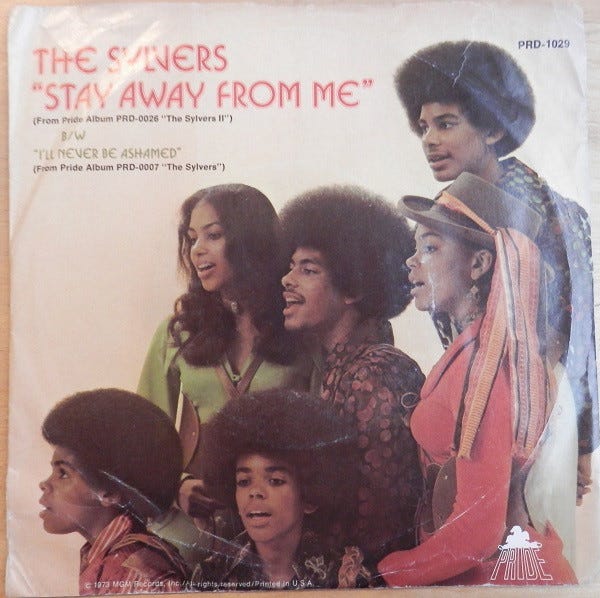The Leon Sylvers III Interview Part 3
Reflections on The Sylvers' catalog as a frequently used sample source.
Click here to read for Part 1 of my conversation with Leon Sylvers III. Click here to read Part 2.
Little did The Sylvers know at the time, but the 1973 release of Foster Sylvers’ “Misdemeanor” coincided with a burgeoning cultural force that was developing on the other side of the country in the Bronx borough of New York City. As the siblings found their footing in the music industry, DJ pioneer Kool Herc used two turntables and a mixer to isolate and extend various breaks in his record collection at now legendary block parties. His innovation led to the widespread popularity of DJs repeating their favorite breakbeats as way to heighten crowd energy during performances throughout the 1970s and beyond.
The eventual advent of DIY sampling techniques like pause tapes in the late-‘70s and ‘80s, looser sampling laws, and increasingly more affordable sampling technology led to an explosion of game-changing production techniques throughout the 1980s. With rap music an established cultural and commercial force as the decade came to a close, “Misdemeanor”—which first began with Leon’s bass/footstomp Sanyo tape demo—started to find a new listener demographic fourteen years after its initial release.
Foster Sylvers’ hit had already been covered, with pianist Ahmad Jamal recording a beautiful take on the track for his 1974 LP Jamalca—a cover version that would later become an important sample source in its own right. Grandmaster Flash, however, was the first to sample “Misdemeanor” by employing an interesting, fragmented style on “Tear the Roof Off” from his 1987 Ba-Dop-Boom-Bang album.
British rap pioneer Derek B and legendary Juice Crew MC Big Daddy Kane soon followed suit, with their tracks “Success” and “On The Move” each taking tiny bits of “Misdemeanor” in a more subtle, understated style. But it was Dr. Dre’s booming, obvious use of the tune on The D.O.C.’s 1989 single “It’s Funky Enough” that was a true breakthrough moment.
In the 31 years since “It’s Funky Enough,” The Sylvers’ albums have become beloved and well-worn source material for producers—with beatmakers dipping into their collective archives countless times. Leon, who seems to have a positive view of sampling, believes that the popularity The Sylvers’ catalog amongst producers has something to do with the group’s youthfulness during their early years of success. “We were teenagers, so everything was new and fresh at the time,” he says.
He believes this fresh, youthful energy was captured on the group’s recordings and later transmitted to new generations. “Most people that sampled us were young,” he says. “It was always the same age as we were or three to four years older, you know what I'm saying? Hip-hop came out and that was another time where young people were into music and they went back and sampled and listened to certain things they picked up on.”
Sharing a label (Pride) with the Incredible Bongo Band also likely played a role in The Sylvers’ growing popularity as a sample source. Not only was Incredible Bongo Band’s 1973 version of “Apache” a favorite of the aforementioned Kool Herc and DJs the world over, the song has also been sampled well over 600 times.
Leon thinks DJs and producers started to seek out labelmates of the “Apache” creators as the record’s legend grew. “They recognized that Pride record logo,” he says. “So everybody looked for that and we were the only other artists on Pride. When they found us, ‘Misdemeanor’ took another level. That's how the process of music works—the ear connects into the next year, then the next ear.”
It’s a fascinating connection to consider, especially because the Incredible Bongo Band’s founder Michael Viner was instrumental in the release of “Misdemeanor.”
The track “Only One Can Win” from The Sylvers’ 1972 debut is another memorable Sylvers song that traveled from ear to ear. Though the specifics of the recording session have faded a bit with time, Leon rememembers The Sylvers co-producer Keg Johnson’s respect for the group’s original creations as being instrumental to the development of the song. He also recalls feeling a special fondness for the record as the group recorded it. “It was one of my favorites, ‘cause I liked the harmony,” he says.
Though just five artists have sampled “Only One Can Win,” the late J Dilla’s legendary Donuts rework “Two Can Win” is so powerful it will no doubt remain the industry standard on trying to do something new and unique with the original. Leon’s son Leon Sylvers IV, who is also an accomplished producer, introduced his father to Dilla’s famous instrumental.
Remarkably, after having such a profound influence on recorded music as a bass player, multi-instrumentalist, singer, songwriter, and producer—an influence that today’s generation of producers continues to turn to for inspiration—Leon Sylvers III shows no signs of music industry fatigue.
In fact, he’s still listening to the world around him for new ideas and inspiration. “I'm always listening, ‘cause it's a life thing,” he says. “Songs come from episodes and escapades in life, you know, and the more you get close to that, the more identifiable the song is.”
If you enjoyed this article, please subscribe to the Micro-Chop newsletter to support independent music journalism.

